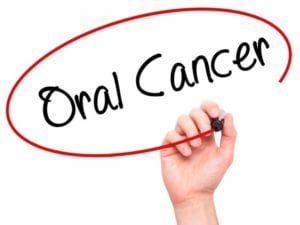 If you or someone you know has recently been diagnosed with oral cancer, you might be wondering what it is, if it’s fixable, and what can be done to improve the condition. To help you understand what having oral cancer really means, consider these common questions and their answers.
If you or someone you know has recently been diagnosed with oral cancer, you might be wondering what it is, if it’s fixable, and what can be done to improve the condition. To help you understand what having oral cancer really means, consider these common questions and their answers.
What is Oral Cancer?
Oral cancer is a cancer of the mouth, which begins to become apparent when cancer cells begin to grow out of control. Parts of the mouth that can be affected include:
- Lips
- Inner lining of the lips
- Inner lining of the cheeks
- Tongue
- Gums
- Hard Palate
- Floor of the mouth, or roof of the mouth
Most oral cancer cases are squamous cell carcinomas, which means that the cells tend to form in the flat squamous cells along the mouth and throat.
How is it diagnosed?
In some cases, a dentist will recognize suspicious cancerous or pre-cancerous lesions of the mouth during a regular checkup. However, it is most often that they become detected when a patient complains of typical symptoms and signs.
Symptoms to look out for would include:
- Mouth sore/pain that won’t go away
- Pain in the teeth or jaw
- Lump or thickening in the mouth or neck
- White or red patches inside the mouth
- Difficulty swallowing
- Voice change
Should a dental professional believe a patient might have oral cancer, a variety of procedures can be performed, including head and neck exams, a biopsy, blood tests, imaging, or a dental exam.
How is oral cancer treated?
Depending on the patient’s individual situation and how advanced the cancer is, they might be treated with one or a variety of therapies. The length of the treatment will also depend on the individual i.e. Stage of cancer, type of treatment, etc. These therapies can include surgery, chemotherapy, radiation, or a combination of any of the three.
In most cases, a surgical procedure must be done to remove the cancerous cells from the area. Surgery is common in cases where cancer hasn’t spread to other areas of the body, or for recurring cancer symptoms. Often times, this surgery will be combined with other therapies including radiation therapy and chemotherapy.
In some cases, surgery will require the removal of the tumor and surrounding tissues (ex. Neck lymph nodes); however, in more severe cases, parts of the mouth may need to be removed. Fortunately, there are a plethora of reconstructive treatments that can help to improve the overall look and function of the face and mouth post-surgery.
Every Case is Unique
Treating cancer as early as possible yields much more promising outcomes. If you feel you have any of the symptoms mentioned above, consider seeing a qualified oral health specialist for advice, or scheduling an appointment with an oncologist right away.
Keep in mind that oral cancer is heavily connected to tobacco and alcohol use. If you can avoid these bad habits, you could be strengthening your chances of a healthy mouth.
The information and content on our website should not be used as a substitute for medical treatment or advice from your doctor.









